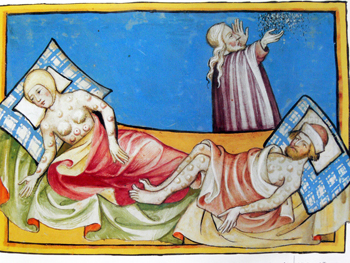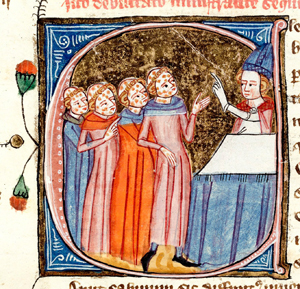The People of God as a Positive Social Epidemic
For Sunday February 23, 2014
Lectionary Readings (Revised Common Lectionary, Year A)
Leviticus 19:1–2, 9–18
19:1 The Lord said to Moses,
19:2 “Speak to the entire assembly of Israel and say to them: ‘Be holy because I, the Lord your God, am holy.
19:9 “‘When you reap the harvest of your land, do not reap to the very edges of your field or gather the gleanings of your harvest.
19:10 Do not go over your vineyard a second time or pick up the grapes that have fallen. Leave them for the poor and the foreigner. I am the Lord your God.
19:11 “‘Do not steal. “‘Do not lie. “‘Do not deceive one another.
19:12 “‘Do not swear falsely by my name and so profane the name of your God. I am the Lord.
19:13 “‘Do not defraud or rob your neighbor. “‘Do not hold back the wages of a hired worker overnight.
19:14 “‘Do not curse the deaf or put a stumbling block in front of the blind, but fear your God. I am the Lord.
19:15 “‘Do not pervert justice; do not show partiality to the poor or favoritism to the great, but judge your neighbor fairly.
19:16 “‘Do not go about spreading slander among your people. “‘Do not do anything that endangers your neighbor’s life. I am the Lord.
19:17 “‘Do not hate a fellow Israelite in your heart. Rebuke your neighbor frankly so you will not share in their guilt.
19:18 “‘Do not seek revenge or bear a grudge against anyone among your people, but love your neighbor as yourself. I am the Lord.
Psalm 119:33–40
119:33 Teach me, Lord, the way of your decrees, that I may follow it to the end.
119:34 Give me understanding, so that I may keep your law and obey it with all my heart.
119:35 Direct me in the path of your commands, for there I find delight.
119:36 Turn my heart toward your statutes and not toward selfish gain.
119:37 Turn my eyes away from worthless things; preserve my life according to your word.
119:38 Fulfill your promise to your servant, so that you may be feared.
119:39 Take away the disgrace I dread, for your laws are good.
119:40 How I long for your precepts! In your righteousness preserve my life.
1 Corinthians 3:10–11, 16–23
3:10 By the grace God has given me, I laid a foundation as a wise builder, and someone else is building on it. But each one should build with care.
3:11 For no one can lay any foundation other than the one already laid, which is Jesus Christ.
3:16 Don’t you know that you yourselves are God’s temple and that God’s Spirit dwells in your midst?
3:17 If anyone destroys God’s temple, God will destroy that person; for God’s temple is sacred, and you together are that temple.
3:18 Do not deceive yourselves. If any of you think you are wise by the standards of this age, you should become “fools” so that you may become wise.
3:19 For the wisdom of this world is foolishness in God’s sight. As it is written: “He catches the wise in their craftiness”;
3:20 and again, “The Lord knows that the thoughts of the wise are futile.”
3:21 So then, no more boasting about human leaders! All things are yours,
3:22 whether Paul or Apollos or Cephas or the world or life or death or the present or the future—all are yours,
3:23 and you are of Christ, and Christ is of God.
Matthew 5:38–48
5:38 “You have heard that it was said, ‘Eye for eye, and tooth for tooth.’
5:39 But I tell you, do not resist an evil person. If anyone slaps you on the right cheek, turn to them the other cheek also.
5:40 And if anyone wants to sue you and take your shirt, hand over your coat as well.
5:41 If anyone forces you to go one mile, go with them two miles.
5:42 Give to the one who asks you, and do not turn away from the one who wants to borrow from you.
5:43 “You have heard that it was said, ‘Love your neighbor and hate your enemy.’
5:44 But I tell you, love your enemies and pray for those who persecute you,
5:45 that you may be children of your Father in heaven. He causes his sun to rise on the evil and the good, and sends rain on the righteous and the unrighteous.
5:46 If you love those who love you, what reward will you get? Are not even the tax collectors doing that?
5:47 And if you greet only your own people, what are you doing more than others? Do not even pagans do that?
5:48 Be perfect, therefore, as your heavenly Father is perfect.
After college graduation last spring, my daughter took a job at a university hospital as a clinical research coordinator in infectious diseases. That's crazy, I thought, as I pondered the lectionary for this week — infectious diseases were part of the Hebrew holiness code three thousand years ago (Leviticus 13-14). What's the connection between then and now?
Infectious diseases can turn into epidemics that destroy entire communities. All sorts of pathogens (viruses, bacteria, parasites, etc.) can be transmitted in all sorts of ways (food, bugs, air, fluids, etc.). The 14th-century bubonic plague killed 75–200 million people. Smallpox, measles and typhoid wiped out ninety percent of the native American population. Right now a cholera outbreak in Haiti has killed over 8,000 people.
What's true for the physical health of a community is also true for its civil, moral, and spiritual health. We speak, for example, of a drug epidemic or an epidemic of gun violence.
But we can flip this and also think of epidemics in a positive sense. That's what Rabbi Joshua Levine did in a 2009 Huff-Po article.
Levine challenges us to spread positive social epidemics throughout our communities. In particular, he encourages a new epidemic of compassion, honor, goodness, gratitude, civility, and respect.
 |
The Black Death from the Toggenburg Bible (1411). |
That's what three of the readings for this week do — they urge God's people to spread life-giving social epidemics by reflecting his character. In each instance, the reading contrasts a negative with a positive social epidemic. God's people thus model a healthy alternative to our diseased communities.
"Don't live like the other nations," says Leviticus 19, either Egypt that was their past or the land of Canaan that was their future. Rather, "be holy, for I am holy." Instead of slander, hatred, revenge, and grudges, says Leviticus 19, remember the poor, the alien, the aged, the deaf, and the blind. Love your neighbor as yourself (19:5). In short, reflect the character of God who is perfect love and infinite goodness.
"Don't live like a Roman tax collector or a pagan Gentile," says Jesus in Matthew 5. Don't hoard your money, give it away. Share, don't sue. Instead of obsessing about yourself, care for others. Beyond your prudent planning for the cares of life, abandon yourself to a God who is both infinitely powerful and intimately personal. After you've hedged every bet and calculated every contingency, enjoy the beauty of bird song and the fragrance of flowers.
"Don't live like infants, worldly people, or like 'mere mortals,'" says Paul (1 Cor. 3). Don't follow the "wisdom of the world," rather trust yourself to "the foolishness of God." Don't let social discord infect the Christian body: "I follow Paul, I follow Peter, I follow Jesus." Rather, celebrate a unity beyond uniformity, and a diversity beyond divisions.
The community of God thus reflects the character of God; it "shows forth the praises of him who called you" (1 Peter 2:9). And to reflect God's character, the community has received God's commandments.
The word "commandments" is an unfortunate translation that can evoke negative connotations. We shouldn't think of legalistic rule-keeping, which only leads to self-righteousness or despair. I like to think of God's commandments as promises rather than prohibitions. Even an ancient and enculturated text like Leviticus makes this clear.
Leviticus 19 is part of a complex holiness code that regulated community life for the Hebrew people 3,000 years ago. By one count there are 613 "commandments" in the five books of Moses.
 |
Plague victims being blessed, late 14th-century manuscript by James le Palmer. |
The purity laws in Leviticus 11–26 regulated every aspect of being human — birth, death, sex, gender, health, economics, jurisprudence, social relations, hygiene, marriage, behavior, and ethnicity (Gentiles were considered impure). They specify what foods are "clean" to eat, rituals to perform after childbirth or a menstrual cycle, prohibitions against contact with a human corpse or dead animal, instructions about nocturnal emissions, guidelines for planting seeds and mating animals, and regulations about mildew, tattoos and child sacrifice.
Some of these purity laws encoded common sense or moral ideals that we still follow today, like prohibitions against incest. Others regulated hygiene and sanitation. Still others symbolized Israel's unique identity that differentiated it from pagan nations. Ultimately, though, the holiness code ritualized an exhortation from Yahweh that is as relevant today as it was back then: "Be holy, because I, the Lord your God, am holy" (Leviticus 19:2, NIV).
God's community should thus reflect his character through the help of his commandments.
Some people object to rules and regulation. To me, after you update the enculturation of the ancient text, Leviticus sounds like paradise.
Imagine a community where people didn't steal, but rather shared liberally with others in need. Think what work would feel like if employers never exploited their employees, what courts would be like if witnesses never gave false testimony and judges didn't accept bribes. Dream about a world where women and girls were not trafficked for profit, and where the aged, the alien and the infirm were honored instead of marginalized.
Jesus adopts this ancient text as a manifesto of his mission. He didn't come to abolish this ancient law, he says, but to fulfill, broaden and deepen it. He provokes us to move beyond outward ritual to inward transformation, to live with interior compassion for people instead of exterior compliance to a law.
When that happens, he says, the people of God reflect the character of God. They spread all sorts of positive social pathogens that build a healthy community that's nothing short of "perfect" (Matthew 5:48). And it's perfect not because we always reach the ideal, but because above all things we seek to be "merciful" (Luke 6:36).
(For Levine's article see http://www.huffingtonpost.com/rabbi-joshua-levine-grater/spreading-positive-social_b_303007.html)
Image credits: (1, 2) Wikipedia.org.





